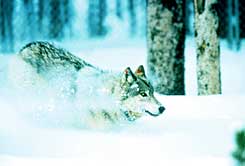The senior wolf pays a price

A wolf in Yellowstone Park. For British civil servants the situation is the opposite
Direct link to this page: https://www.hayadan.org.il/wolfsnerve.html
Two recent British studies have shown that lower-ranking civil servants are under more stress than higher-ranking civil servants. Animal studies also indicate that individuals at the bottom of the social ladder are more stressed than those at the top of the hierarchy.
But these studies measured stress indirectly (in a study on British civil servants, the level of blood pressure was considered a good measure of the degree of stress), or were based on conflicts between animals in laboratory conditions. Recently, Dr. Jennifer Sands and Dr. Scott Creel from Montana State University were able to measure the stress under which water buffalo live in the wild. They did this by measuring what are known as "stress hormones". The findings, which will soon be published in the journal "Animal Behavior", indicate that, at least in wolves, the individuals at the top of the hierarchy are under greater stress than those at the bottom of the scale.
When mammals are under stress, their bodies have higher levels of the hormone glucocorticoid. It is difficult to measure hormone levels in nature. Any attempt to catch an animal and take a blood sample from it will put the animal under great stress, and therefore the findings will be worthless. In order to get around this obstacle, Dr. Sands and Dr. Krill decided to collect and test excrement from wolves in the wild.
The researchers followed three packs of wolves in Yellowstone Park in the western United States and collected the feces of the animals. An examination of the feces revealed that the levels of glucocorticoid in the blood of the wolves at the top of the social hierarchy of the pack, both males and females, were significantly higher compared to the wolves in the lower stages of the social hierarchy.
A possible explanation for the high levels of stress hormone in the leader wolves is that they need increased physical activity to maintain their status. However, this explanation is not very likely, since even in periods of calm, when there is no threat to the leaders, their stress hormone is high compared to the wolves that are subordinate to them.
Wolves struggling to maintain their position at the top of the social hierarchy in the pack seem to pay a lasting price. It is not clear exactly what that price is, but it is clear that it has considerable harmful consequences. High levels of stress hormone for several consecutive days may suppress the immune system, which increases the risk of infections. The pack leaders may therefore pay for their status in a shorter life.
Economist
https://www.hayadan.org.il/BuildaGate4/general2/data_card.php?Cat=~~~669776618~~~195&SiteName=hayadan
